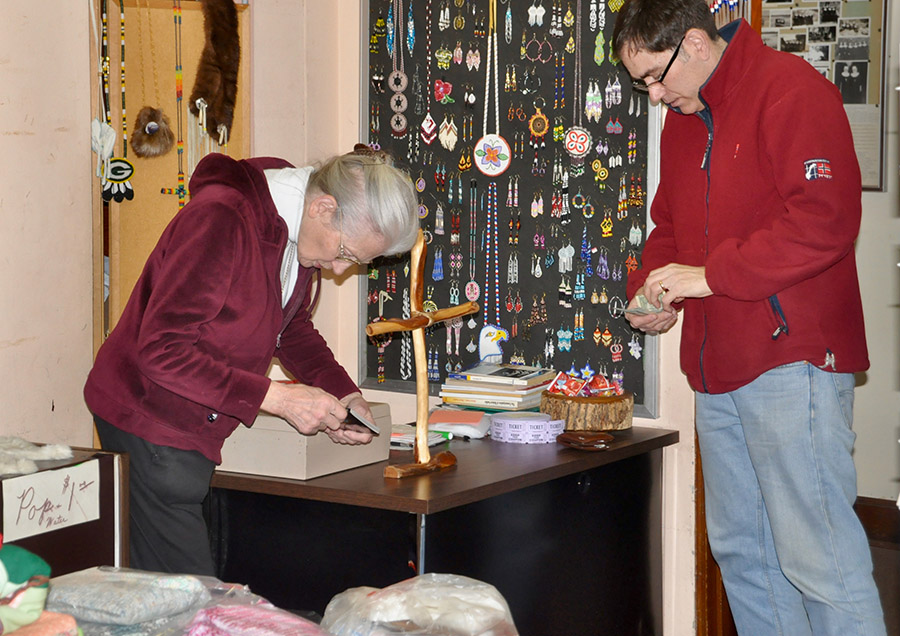
Sr. Felissa Zander checks out a customer at the store in St. Francis Solanus Catholic School. The store sells handcrafted Native beadwork, quilts, art, dolls and more. (Catholic Herald photo by Anita Draper)
Anita Draper
Catholic Herald staff
For six decades, Sr. Felissa Zander has ministered to generations of students in the mission parish and school of St. Francis Solanus in Reserve, located on the reservation of the Lac Courte Oreilles Band of Lake Superior Ojibwe in Sawyer County.
She and her ministry partner, Sr. Maryrose Theobald, who is celebrating her 70th jubilee this year, are from the Milwaukee-based School Sisters of St. Francis.
The Vatican’s World Day of Prayer for Vocations was Sunday, April 21. The day promotes vocations to the priesthood and religious life; Sr. Felissa, whose 70th jubilee was in 2023, said her life as a religious sister has been both joyful and eventful.
“I don’t let myself get bored. I have a great life,” she added. “I try to live up to my name – ‘Felissa‘ (means) … most happy. -Issa is the superlative in Latin.”
Post-Vatican II, many religious sisters have been asked to transition from ministry to ministry, meeting new needs as they arise, but Srs. Felissa and Maryrose have taken the more traditional approach of dedicating their vocational lives to a single community, building trust and relationships in their quest to build the kingdom of God.
Franciscan principles guide their life there.
“People come first,” Sr. Felissa said. “You’ve got to take time … take care of the needs of the people first.” When someone asks her, “Are you busy?” She responds, “I’m not that busy.”
The School Sisters of St. Francis established their mission in Reserve in 1885. There was never a boarding school there; although Sr. Felissa has heard some positive accounts of boarding school from grandmothers in the area – all the stories are not negative, she said – she’s glad her religious community emphasized integrating the tribe’s cultural heritage in their effort to provide education for its members.
On a tour of the St. Francis Solanus church, built a century ago from locally quarried pipestone (not from Minnesota!), she points out the wigwam behind the altar, the handcrafted beadwork, the windows and art and statuary that includes Native and Franciscan imagery. Liturgically, too, they try to fit Native traditions into services and funerals where they can, and Ojibwe dancers and drummers have shared their culture through prayers at the opening of diocesan Chrism Masses and other major diocesan events, including the ordination of Bishop James P. Powers, for years.
“We’ve always promoted the cultural things,” she added.
There have been many changes in her years working with the Lac Courte Oreilles, but challenges – poverty, homelessness, alcohol and drug addiction, illness and a lack of available services in the deeply rural area – remain. Still, she is steadfastly focused on the good, on using faith and humor to get through the trials of life.
“People worry about things too much,” she said. “You don’t let yourself get depressed. You just don’t.”
The devil wants you to get depressed, she believes. “Then he doesn’t have to tempt you or do anything.”
The death of a loved one, for example, is cause for mourning, but “not so much that you pull yourself down. You have to know how to handle death,” she said. “You have to know how to deal with a crisis.
Overall, she added, “I live a happy life, even if things don’t go my way …. with God, you can do anything.”
In educating her students, she encourages them to find good role models among the saints – St. Ambrose, for example, or St. Kateri Tekakwitha, whose intercession they seek every day. Repetition is the key to teaching religion, she believes – that, and reminding students, “Religion is your relation to God. Culture is your relation to people. God is No. 1.
“You have to teach religion like you teach sports,” she advised. A lot of religion teachers teach from the book, but her method involves introducing prayer, sacraments and commandments, and then “repeat and repeat and repeat.”
She feels grade school is the best time for kids to learn about God – they get “distracted” in high school – and they will come back to their faith later in adulthood.
St. Francis Solanus is the only tuition-free Catholic school in the diocese and the only Catholic school in Sawyer County, and it is open to all children, whether they live on the reservation or not. Finding financing for vehicles and supplies and repairs has been an ongoing struggle; she and Sr. Maryrose continue to live their Franciscan vow of poverty, of not clinging to worldly things.
“When you think about vocation, no matter if it’s married life or anything, you’ve got to be selfless,” she commented. “Selfish behavior ruins everything.”
Still, Sr. Felissa’s vocational life has not been without perks. She’s traveled at others’ invitation to holy sites in Rome, Assisi, Fatima and Lourdes, among other places, as well as England and Scotland. Her travel expenditures totaled $140, which she spent on gifts, lighting candles and sending postcards to her students.
“You practice, you teach in all you do,” she summarized. “God gives the inspiration, God does the whole works. You don’t think about what you are going to accomplish.”
Inevitably, success is “God’s business.”
“You don’t come to a mission thinking you’re the bigshot, and you’re going to save people,” she explained. “God has already done that.”
